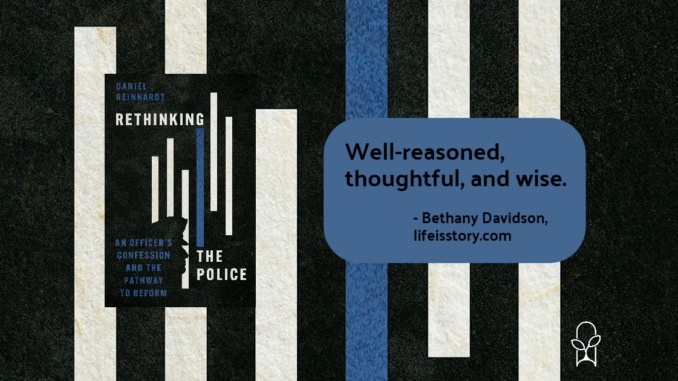
Also by this author: Rethinking the Police: An Officer's Confession and the Pathway to Reform
Published by IVP on November 21, 2023
Genres: Non-Fiction, Christian Life, Racial Reconciliation, Social Justice
Buy on Amazon
Goodreads

A former officer grapples with the reality of our broken police culture
Our society has long been stuck in cultural and ideological battles about police brutality and the police force's broken relationship with our communities. Rethinking the Police promises to start a more hopeful conversation.
Daniel Reinhardt spent twenty-four years as a police officer near Cleveland, Ohio. He was long unaware of the ways the culture of the police department was shaping him, but gradually, through his own experiences as a police officer and through the mentorship of Black Christians in his life, his eyes were opened to a difficult truth: police brutality against racial minorities was endemic to the culture of the system itself.
In Rethinking the Police, Reinhardt lays out a history of policing in the United States, showing how it developed a culture of dehumanization, systemic racism, and brutality. But Reinhardt doesn't stop there: he offers a new model of policing based not in dominance and control but in a culture of servant leadership, with concrete suggestions for procedural justice and community policing.
Daniel Reinhardt is a former police officer, and because of his vocational experience, he has an especially helpful perspective. A lot of people have big opinions about this topic without really understanding the issues at play beyond the headlines, and without understanding how law enforcement actually works. Reinhardt’s incisive critiques are particularly persuasive because of his experiences, and his ideas for reform take lots of real-world nuances into account. For example, when he writes about problematic leadership structures within law enforcement, he also acknowledges that a strict hierarchy can keep people alive as a dangerous situation unfolds. Reinhardt’s real-world perspective and personal experiences greatly enrich this book, and I appreciate his contributions to the wider conversation about police reform.
The first half of Rethinking the Police focuses on defining the problem. Reinhardt explores the history of policing, and he explains ways that our current police culture leads to officers being socially distanced from the people they serve and prone to an “us versus them” mentality. He explains how aspects of police culture can breed dehumanization and abuse, and he points out that attempts at new trainings and policy changes will always fall short as long as they aren’t addressing a police department’s internal culture, and the way that officers actually do things when they’re not going by the book. He also writes about leadership issues within police departments, criticizing the norm of domineering, control-based leadership.
When Reinhardt writes about biases in law enforcement, he summarizes how different models of policing work. He explains that even when individual police officers have never targeted anyone for their race, the prevailing approach targets high-crime areas with extra-vigilant policing, catching tiny infringements and strictly enforcing minor laws that the same officer would let slide in a different neighborhood. Reinhardt explains that even though people will defend this model because it is data-driven, these kinds of interactions create additional hostility and encourage the police to be distant from the people they serve, instead of engaging with the community and building cooperation with residents.
Throughout the second half of the book, Reinhardt explores how a model of servant leadership can help mitigate common problems and encourage a better culture of policing. He clearly explains theories about servant leadership and shares examples of what it looks like in practice, both in terms of how officers relate to the public and how police department leaders relate to their officers. Reinhardt writes from a Christian perspective and primarily directs this book to an audience that shares his beliefs, but even though his critiques and suggestions flow from a Bible-based worldview, he shows how these principles fully apply to secular workplaces. Reinhardt also engages with the different ethical philosophies that different policing approaches embody, and he shares some practical ideas for how police departments can better engage with African American community members.
Rethinking the Police: An Officer’s Confession and the Pathway to Reform is a thoughtful, nuanced, and helpful look at a controversial issue. Reinhardt makes pointed critiques about American policing while also acknowledging the sacrifices that police officers make, especially when they are working in hostile, controlling departments. All throughout, Reinhardt speaks to a broad audience with nuance and clarity, and his personal experience and deep knowledge can help persuade skeptics while also challenging people who already agree with him to better understand policing from the inside, and how to achieve meaningful and lasting reform.
